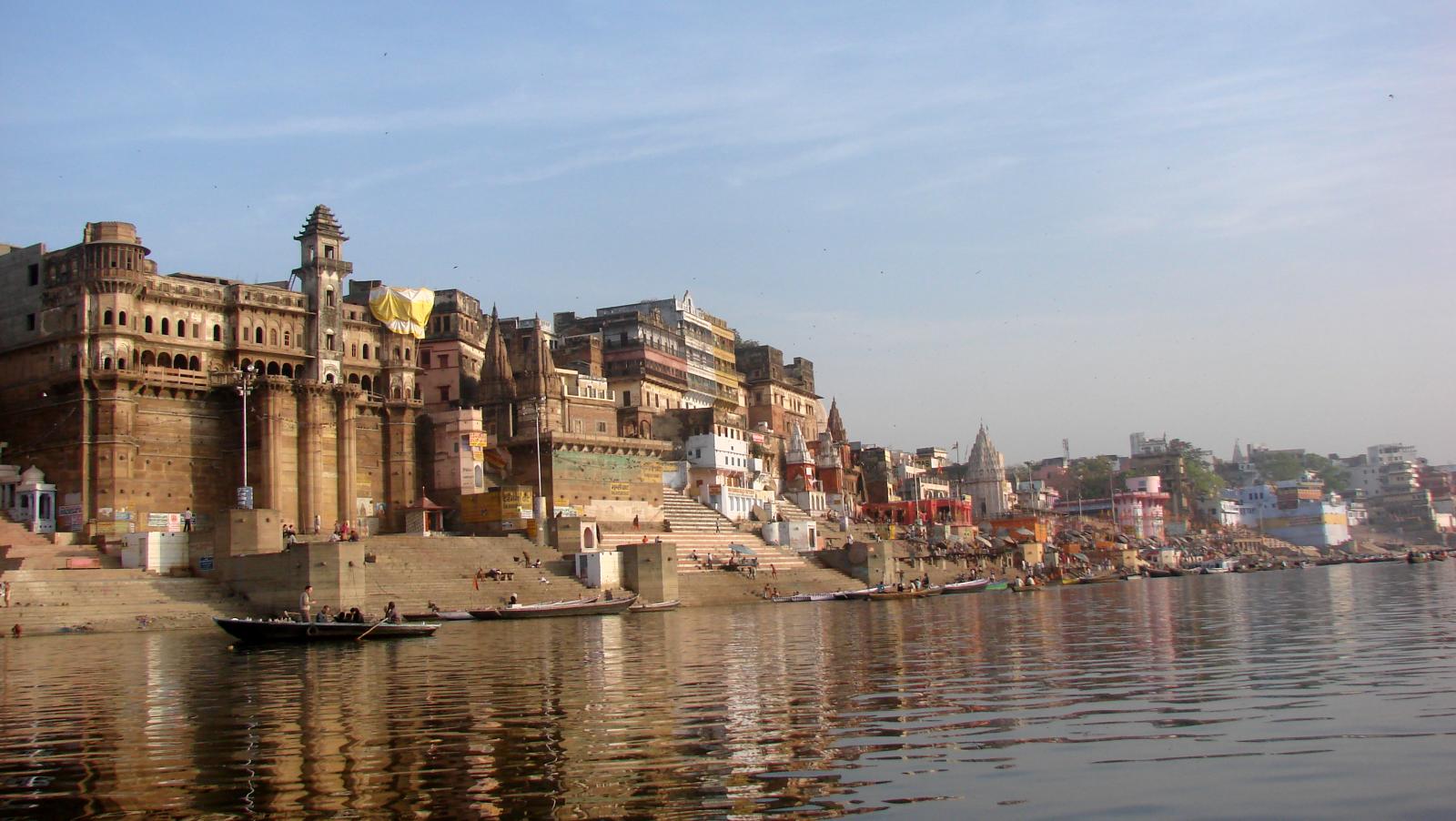Abhinav
Writer
Updated On - Feb 03, 2026
9 min
Published On - Feb 03, 2026
Kashi, Banaras, & Varanasi: The Untold Story Behind the Holy City’s Names
Why does this one great city have three distinct names that are all still relevant simultaneously? What do they signify, and how have they shaped its legacy?
For centuries, the great city of Banaras has symbolized faith, enlightenment, and devotion for over a billion Hindus worldwide. For devotees, Banaras is the holiest place on Earth—a city where the sacred Ganga washes away one’s sins, temple bells echo through every alley, and the divine looks over the rest of us. But Banaras is not how this city was originally known. It was first called Kashi, before evolving into the thriving cultural hub of Banaras and finally adopting its modern identity as Varanasi.
So why does this one legendary city have three distinct names that are all still relevant simultaneously? What do they signify, and how have they shaped its legacy?
This blog unravels the untold story behind these names, tracing their origins and meanings—from the divine glow of Kashi to the vibrant life of Banaras and the sacred geography of Varanasi.
The Three Names of a Timeless City
This holy city in eastern Uttar Pradesh has been known by three names over the centuries: Kashi, Banaras, and Varanasi. Each name carries a distinct legacy, shaped by spiritual beliefs, cultural evolution, and historical influences. Some names are deeply rooted in ancient scriptures and mythology, while others emerged through linguistic and societal transformations. But what do these names truly signify, and why do they continue to coexist? Let’s uncover the meaning and significance of each.
Kashi – The City of Light and Moksha
With a name predating history itself, Kashi has been revered as a sacred beacon of enlightenment and salvation for millennia. It is said to be a place beyond time, where the divine presence is most palpable and liberation is within reach.
The Eternal Name of the Divine City
The name Kashi originates from the Sanskrit root "Kāś," meaning "to shine" or "to illuminate." This city, according to Hindu tradition, has been a center of spiritual wisdom and enlightenment since time immemorial. Ancient scriptures like Rig Veda describe Kashi as a place blessed by the gods, where seekers come to transcend earthly bonds and attain the highest knowledge. It is believed that Kashi is not just a city, but an eternal realm beyond worldly destruction.
Lord Shiva’s Eternal Abode
Hindu tradition holds that Lord Shiva himself resides in Kashi, making it unlike any other place on Earth. According to legend, those who die here are granted moksha—liberation from the cycle of rebirth—because Shiva himself whispers the Taraka Mantra into their ears, ensuring their soul’s passage to freedom. The city is often referred to as "Avimukta Kashi", meaning "the place never abandoned," signifying Shiva’s eternal presence here. The Kashi Vishwanath Temple, one of the twelve Jyotirlingas, stands as the city’s spiritual heart, where thousands gather daily to offer prayers to the “Lord of the Universe”.
Kashi: The Ever-Shining Spiritual Capital
Unlike Banaras and Varanasi, which evolved through cultural and geographical shifts, Kashi has remained timeless. It is not just a name but an idea, a belief, and a spiritual calling. Even today, those speaking of the city’s divine essence refer to it as Kashi—a place where the soul finds its final rest in the embrace of the divine.
Banaras – The Cultural and Historical Identity
Banaras is more than just a name—it is a living tradition. This is the city of poets, musicians, and scholars, where art and philosophy have flourished for centuries. While Kashi symbolizes divine radiance, Banaras reflects the cultural heartbeat of India.
A Name Born of Time and Tradition
The origins of Banaras remain a subject of debate among historians, but many believe it evolved from "Varanasi" through linguistic shifts over centuries. By the medieval period, Banaras had become the most widely used name for the city, associated with its thriving markets, academic institutions, and artistic legacy. Unlike Kashi, which signifies spirituality, Banaras became synonymous with culture, commerce, and scholarship.
Banaras: The City of Scholars, Poets, and Music
Under the name Banaras, the city flourished as a center of learning, music, and literary excellence. It gave birth to some of India’s greatest minds, including:
Kabir – The mystic poet who questioned religious dogma and preached unity.
Tulsidas – The saint-poet who wrote the Ramcharitmanas here.
Ustad Bismillah Khan – The legendary shehnai maestro who immortalized Banaras in Indian classical music.
In the early 20th century, Banaras Hindu University (BHU) was established, further strengthening the city’s identity as an intellectual powerhouse. Even today, BHU remains one of India’s premier institutions of higher learning.
Banaras: A Name That Lingers in Everyday Life
Though Varanasi is the official name, locals continue to call their city Banaras—a name deeply woven into daily conversations, folk songs, and artistic traditions. Banaras lives on in:
Banarasi Sarees – Exquisite silk sarees adorned with gold and silver embroidery.
Banarasi Paan – A signature betel leaf preparation, famous across India.
Banarasi Thandai – A spiced milk drink, especially popular during Holi.
Whether in the scent of its food, the rhythm of its music, or the echoes of its ghats, Banaras remains the cultural soul of this eternal city.
Varanasi – The Sacred Confluence of Two Rivers
Unlike Kashi and Banaras, which reflect spiritual and cultural identities, Varanasi is a name rooted in geography. It defines the city’s physical existence.
The Name Rooted in Geography
Varanasi derives its name from two rivers—Varuna and Assi—that flow through the city. Ancient texts, including the Matsya Purana, mention that the land between these two rivers was known as Varanasi, signifying a natural and spiritual boundary.
Varanasi in Ancient Texts and Traditions
References to Varanasi appear in numerous scriptures, from the Skanda Purana to the Mahabharata, often describing it as the city where dharma flourishes. Pilgrims have journeyed here for centuries to immerse themselves in the sacred waters of the Ganga, believing it washes away sins and brings them closer to liberation. Despite the many changes that India has undergone, Varanasi has remained a constant—a city where devotion, ritual, and tradition have stood the test of time.
Varanasi: The Modern Identity
In 1956, the Government of India officially adopted Varanasi as the city’s name, making it its modern and internationally recognized identity. Today, it is the name that appears on maps, government records, and international forums, firmly establishing it as the spiritual heart of India in the eyes of the world. While Kashi remains a name of mysticism and salvation, and Banaras a name of culture and legacy, Varanasi is the city’s formal and global presence—bridging its ancient past with its evolving future.
Which Name Truly Defines This Eternal City?
Kashi, Banaras, and Varanasi—three names, one sacred city. Each represents a different dimension of this timeless place:
For the devout, it will always be Kashi, the city of liberation.
For the artist and scholar, it is Banaras, the city of tradition and learning.
For the world, it is Varanasi, the spiritual capital of India.
But matter what you call it, this city remains an eternal beacon of faith, wisdom, and devotion—where time stands still, and the divine feels just a little closer.
Embark on Your Sacred Journey with BizareXpedition
No matter what name you call it—Kashi, Banaras, or Varanasi—this city remains a place where the spiritual and the earthly merge, where time stands still, and where the divine feels just a little closer. To truly experience its essence, one must walk its ancient lanes, witness the mesmerizing Ganga Aarti, and feel the weight of history, faith, and devotion that lingers in the air.
At BizareXpedition, we bring you closer to the soul of Varanasi with thoughtfully curated pilgrimage experiences that are as seamless as they are enriching. Whether you seek the divine blessings of Kashi Vishwanath, the tranquility of the Ganga Ghats, or a journey through the Panch Kedar, we ensure that every aspect of your spiritual quest is taken care of with expert guidance, seamless travel arrangements, and personalized itineraries.
Why Choose BizareXpedition for Your Pilgrimage?
Expert Guidance
With over a decade of experience in pilgrimage tourism, our knowledgeable team ensures your journey is insightful, meaningful, and spiritually fulfilling.
Seamless Travel
From permits to accommodations, we manage every detail so you can focus solely on your spiritual experience.
Affordable & Customized Packages
We believe every devotee should have access to a divine experience, which is why we offer budget-friendly and tailored packages to suit every traveler.
Trusted & Recognized
Endorsed by TripAdvisor and trusted by Uttarakhand government authorities, we are committed to safe and well-organized pilgrimage experiences.
Begin Your Sacred Journey Today
Let BizareXpedition be your guide as you walk in the footsteps of saints and seekers, soaking in the divinity of Kashi, Banaras, and Varanasi. Whether it’s a darshan at Kashi Vishwanath, a trek to the Panch Kedar, or an immersive cultural experience along the Ganga Ghats, we ensure that your spiritual journey is one of devotion, peace, and enlightenment.

